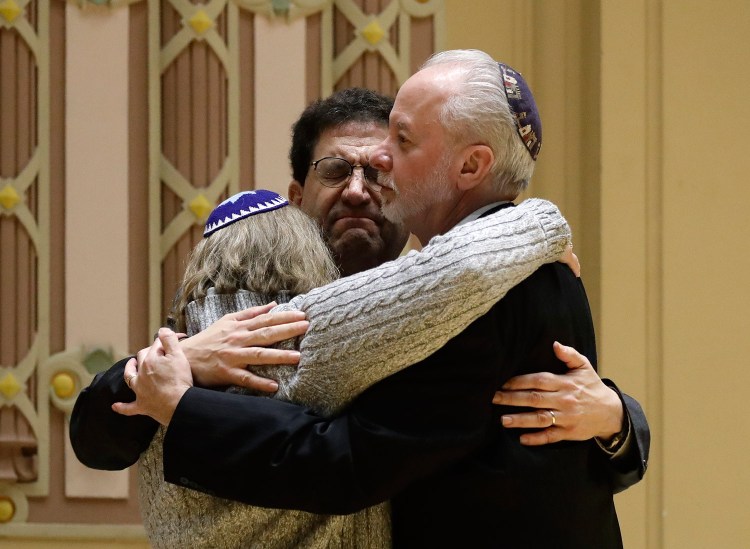In a story most Muslims believe to be authentic, the Prophet Muhammad stands up as a Jewish funeral procession goes by. His companions wonder why he shows such respect. “It is only a Jew,” they say. The Prophet replies, “Was he not a soul?”
I have mixed feelings about this story. I like its message: Everyone has a soul and should be honored. But it bothers me, too; the need to remind us that even a Jewish person has a soul, and must be honored, leaves me uneasy.
In the early hours of Saturday, Oct. 27, when I first learned of the attack at the Tree of Life synagogue in Pittsburgh, I felt cold shivers. I worried the attacker was a Muslim. I suppose every minority reacts with similar insecurity, because we know how blame works.
Now we know the attacker was Robert Bowers, who is not Muslim. But probably random white men of Christian origin were not asked, as if they all shared blame, “What do you think about the attack on the Tree of Life synagogue?”
To be honest, my initial fear that the attacker might be Muslim wasn’t just an expression of an insecure minority but the result of what I know to be a real problem: the persistence of anti-Semitism in Muslim communities. Like many Muslims, I grew up with anti-Semitic attitudes. I remember when, in 1986, only a few miles from my home in the Beyoglu neighborhood of Istanbul, a terrorist killed 22 Jewish worshippers at the Neve Shalom Synagogue during a Shabbat service.
Though there are fewer than 20,000 Jewish people left in Turkey, conspiracy theories about Jewish people and power were everywhere. I grew up hearing that all that had gone wrong in Turkey was because of those who are Jewish. Many believed that a secretive Jewish sect, the Donmeh, and supposedly Jewish-controlled Masonic lodges, were behind the collapse of the Ottoman Empire. Jewish people also were blamed for all the misfortunes of the Turkish people, and for secular government discrimination against religious Muslims in the past.
My relatives and friends, and the newspapers and magazines I read, all agreed that Jewish people sought global domination. The known forgery “Protocols of the Elders of Zion” was widely available and quoted as if it were factual and authoritative. Hitler’s “Mein Kampf” became a best seller in Turkey in 2005. I was told over and over that Jewish people and Zionists were behind not only Palestinians’ suffering, but also those of Muslims generally.
You might think: What does this have to do with Western Muslims? The uncomfortable truth is that some of my fellow Muslims are the cause of rising anti-Semitism in France, where growing numbers of Jewish people are emigrating because of fear of violence from the Muslim community. As American Muslims, we cannot take comfort in the fact that the killer in Pittsburgh was not Muslim. After all, a Muslim was behind the 2006 attack on the Seattle Jewish Federation, which killed one person and injured five others.
Muslim hatred of Jewish people might be caused by bigotry, supremacism or indignation at the immense suffering of our Palestinian brothers and sisters. Uprooting the deep-rooted anti-Semitism in Islamic institutions, communities and ideas will not be easy. It will require a critical look at Islamic history. It will be daunting because of its scope.
But American Muslims are well positioned to combat anti-Semitism in Muslim communities. After all, within a few days of the Tree of Life shooting, American Muslims raised over $200,000 for the families affected by the synagogue shooting.
This moment brought Muslim and Jewish Americans together as never before. The immediate impetus for Robert Bowers’ terrorist attack was the support for Muslim refugees being offered by the American Jewish resettlement agency HIAS. A fitting response would be to build on Jewish-Muslim solidarity. But that shared home will not be strong unless each community is truly committed to the security and dignity of the other.
Send questions/comments to the editors.



Comments are no longer available on this story